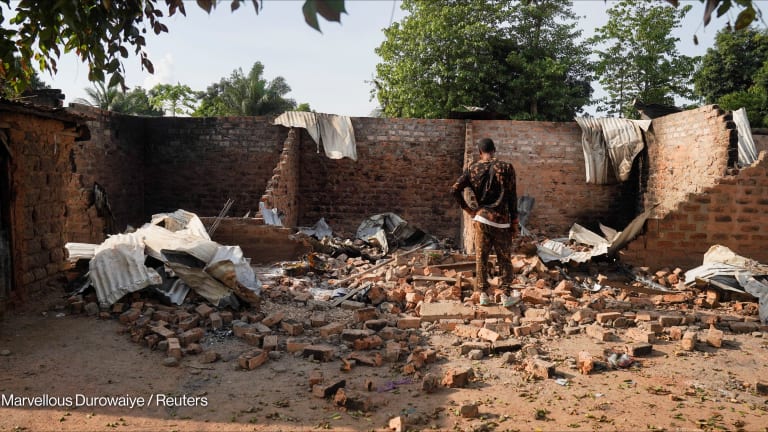
U.S. President Joe Biden’s administration has yet to release strategies for the five priority countries or regions mandated by the Global Fragility Act, which were originally due to be announced by the previous administration in December 2020.
The GFA outlines a new approach to conflict with an emphasis on prevention that acknowledges decades of failed U.S. policy in fragile countries such as Afghanistan and Iraq. Passed by Congress in 2019, the law gave the administration one year to select five priority countries or regions in which to test an overarching global fragility strategy focused on agility in the field and the flexibility to adapt programs to changing circumstances on the ground.
Because those priorities have not been named, implementation of the law has effectively been stalled in the two years since it passed.
Biden nominee commits to Global Fragility Act implementation
Anne Witkowsky will be responsible for repairing interagency relationships to ensure successful implementation of the 2019 Global Fragility Act.
Robert Jenkins, the U.S. Agency for International Development assistant administrator for the Bureau for Conflict Prevention and Stabilization, said last week that specific strategies for the five countries or regions — based on the larger global strategy — are coming “soon.”
“I will not give you a date or a time,” Jenkins said in response to a question from Devex during the Alliance for Peacebuilding’s PeaceCon event. “We’re hoping incredibly soon. It could be any day. We are just about to get over the finish line.”
A USAID spokesperson said that the announcement of the countries or regions is expected “in the coming weeks” and that “the approach to engagement for designated countries and regions will focus on strengthening partnerships and supporting resilience.” USAID referred additional questions to the State Department, which is the lead agency tasked with GFA implementation.
A State Department spokesperson said the U.S. government has undergone a “rigorous analytic and broadly consultative” process to identify the countries or regions.
“We are focusing our diplomatic, development, and security-sector efforts under the [Global Fragility Strategy] in a diverse set of environments and regions where we can collaborate with national and local government and civic partners on an integrated approach to make a positive difference,” the spokesperson wrote to Devex.
“We seek to gain a global perspective on how the United States can continue to learn, adapt, and work collaboratively with partners in similar environments to prevent conflict and build peace.”
The GFA included several reporting requirements that former President Donald Trump’s administration should have completed within a year of the law’s passage. A global fragility strategy was due to Congress in September 2020, which was to lay out how the administration intended to implement the law, as well as five countries or regions where it would pilot the new approach. Specific strategies for those selections were then due in December 2020.
But the Trump administration missed the September deadline. Then, it did not release a global strategy until December 2020 and never picked the five countries or regions. The Biden administration has now spent a year in office without making the selections or corresponding strategies public.
“We’ve got to start [working on conflict prevention]. The starting is so hard, but it’s got to get done. It’s a law. It’s not a suggestion.”
— Elizabeth Hume, executive director, Alliance for PeacebuildingThe GFA was lauded by the peace-building community as a revolutionary way to overhaul U.S. policies that have seen the country spend millions of dollars on programs that ultimately do nothing to avoid or reduce conflict.
Elizabeth Hume, executive director at the Alliance for Peacebuilding, said the Biden administration had a full plate in its first year with the COVID-19 pandemic and the withdrawal from Afghanistan.
“But there’s always going to be something like that. And if we want to get a handle on [conflict] prevention, then we have to be serious about it. We have to be committed to it and get out ahead of it, and that’s what the GFA is about,” Hume said. “But one of the critical first steps is naming these countries and regions so … the real implementation and strategy work can get done, because Congress has said over and over again [that] it can’t be business as usual.”
The GFA stresses the need for a whole-of-government approach to conflict prevention and stabilization, as fragile contexts departments were often not working together effectively in the past. The State Department’s Bureau of Conflict and Stabilization Operations is charged with leading implementation of the law, working closely with USAID and the Defense Department.
The bureau was without a confirmed assistant secretary until Anne Witkowsky, whom Biden announced as his intended nominee for the post in April, was approved by the Senate on Jan. 5. She was sworn in the following week.
“We’ve hit a 30-year high in violent conflict. We now see why prevention is so critical. Working on prevention is the heart of the GFA. It’s not like it went away. It’s still needed now more than ever,” Hume said. “But we’ve got to start. The starting is so hard, but it’s got to get done. It’s a law. It’s not a suggestion.”








